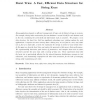Free Online Productivity Tools
i2Speak
i2Symbol
i2OCR
iTex2Img
iWeb2Print
iWeb2Shot
i2Type
iPdf2Split
iPdf2Merge
i2Bopomofo
i2Arabic
i2Style
i2Image
i2PDF
iLatex2Rtf
Sci2ools
111
click to vote
TOIS
2002
2002
Burst tries: a fast, efficient data structure for string keys
Many applications depend on efficient management of large sets of distinct strings in memory. For example, during index construction for text databases a record is held for each distinct word in the text, containing the word itself and information such as counters. We propose a new data structure, the burst trie, that has significant advantages over existing options for such applications: it requires no more memory than a binary tree; it is as fast as a trie; and, while not as fast as a hash table, a burst trie maintains the strings in sorted or near-sorted order. In this paper we describe burst tries and explore the parameters that govern their performance. We experimentally determine good choices of parameters, and compare burst tries to other structures used for the same task, with a variety of data sets. These experiments show that the burst trie is particularly effective for the skewed frequency distributions common in text collections, and dramatically outperforms all other data...
| Added | 23 Dec 2010 |
| Updated | 23 Dec 2010 |
| Type | Journal |
| Year | 2002 |
| Where | TOIS |
| Authors | Steffen Heinz, Justin Zobel, Hugh E. Williams |
Comments (0)

